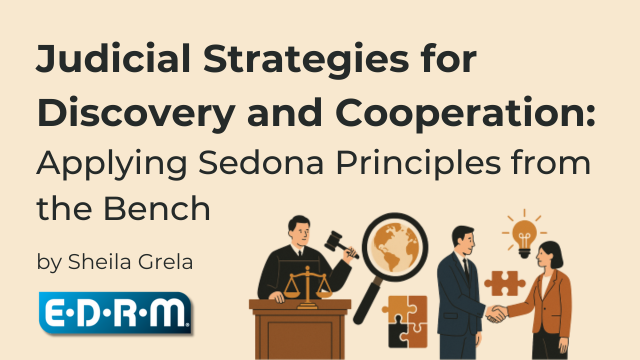
[EDRM Editor’s Note: The opinions and positions are those of Sheila Grela.]
The Sedona Conference has long provided the judiciary with a practical compass for managing discovery. Its resources and principles emphasize cooperation, proportionality, and reasonableness. These values that continue to shape judicial oversight in the modern era of electronic discovery. These themes take center stage in an upcoming EDRM webinar, “Judicial Strategies for Discovery & Cooperation,” on November 5, 2025.
Register here: https://gateway.on24.com/wcc/eh/4208134/lp/5109705/judicial-strategies-for-discovery-cooperation
The session brings together respected leaders who have helped define how courts manage discovery today:
- Hon. Ronald J. Hedges (Ret.), co-senior editor of The Sedona Conference Cooperation Proclamation, Resources for the Judiciary, Fourth Edition (2025)
- Lea Malani Bays, partner at Robbins Geller Rudman & Dowd LLP
- Ruth C. Hauswirth, Special Counsel and Head of Litigation & eDiscovery at Cooley LLP
The program will be moderated by Mary Mack, CEO and Chief Legal Technologist of EDRM.
Sedona’s Framework for Judicial Oversight
The Sedona Conference has long emphasized that effective discovery management begins with early and active judicial involvement. Judge Hedges will outline two complementary models recognized in the Fourth Edition of Sedona’s judicial resources:
- Active Case Management: Judges set expectations early, including ESI planning and discovery scope discussions under Rule 26(f).
- Dispute-Driven Oversight: Courts intervene when cooperation fails, guided by a documented record of proportionality and good faith.
Both models support Sedona’s position that judicial engagement is critical to fairness, efficiency, and proportionality. Active oversight reduces motion practice, clarifies obligations, and builds the transparency required under the Federal Rules of Civil Procedure.
Cooperation and Party Autonomy
Ruth Hauswirth will discuss how courts can foster cooperation without diminishing party autonomy. Sedona’s Cooperation Proclamation encourages a culture of collaboration led by predictable judicial expectations rather than rigid control. Key strategies include:
- Use of Rule 502(d) protective orders to simplify privilege issues.
- Employment of categorical or metadata-based privilege logs to reduce unnecessary burden.
- Early and substantive meet-and-confer discussions that prevent disputes before they escalate.
[C]ooperation is not concession—it is a core professional responsibility that supports the just, speedy, and inexpensive determination of every case.
Sheila Grela.
This approach demonstrates that cooperation is not concession—it is a core professional responsibility that supports the just, speedy, and inexpensive determination of every case.
Proportionality, Technology, and the Modern Record
Lea Bays will address proportionality in practice—how courts assess cost, burden, and accessibility in relation to the importance of the requested information. Sedona’s Fourth Edition expands its proportionality commentary to reflect emerging technologies and modern data types, including AI-assisted review and collaborative platforms. The principles remain consistent: discovery must be reasonable, targeted, and defensible.
Through Sedona’s lens, proportionality is not a tool to limit discovery arbitrarily but a framework for achieving balance between fairness, cost, and efficiency. Documenting this reasoning remains one of the judiciary’s most effective tools for ensuring defensibility and transparency in discovery decisions.
The Judiciary’s Evolving Role
The panel will also explore how the judiciary’s role continues to expand as technology reshapes litigation. Sedona’s judicial resources include model case management orders, privilege log templates, and checklists that promote consistency across jurisdictions. These tools help judges manage remote proceedings, assess AI-assisted workflows, and address cross-border privacy considerations while maintaining procedural integrity.
The discussion will reaffirm that judicial leadership, cooperation, and proportionality are interconnected. Together, they form the structure that allows discovery to evolve without sacrificing fairness or access to justice.
Attend the Webinar
EDRM Webinar: Judicial Strategies for Discovery & Cooperation
Date: November 5, 2025
Time: 1:00 PM ET / 10:00 AM PT
Moderator: Mary Mack
Panelists: Hon. Ronald J. Hedges (Ret.), Lea Malani Bays, and Ruth C. Hauswirth
Register here: https://gateway.on24.com/wcc/eh/4208134/lp/5109705/judicial-strategies-for-discovery-cooperation
About the Event
This complimentary session is presented by EDRM as part of its ongoing judicial education and practitioner engagement series. Attendees will gain practical insights into Sedona’s Fourth Edition resources and the evolving principles of cooperation, proportionality, and active case management in discovery.
Assisted by GAI and LLM Technologies per EDRM GAI and LLM Policy.


